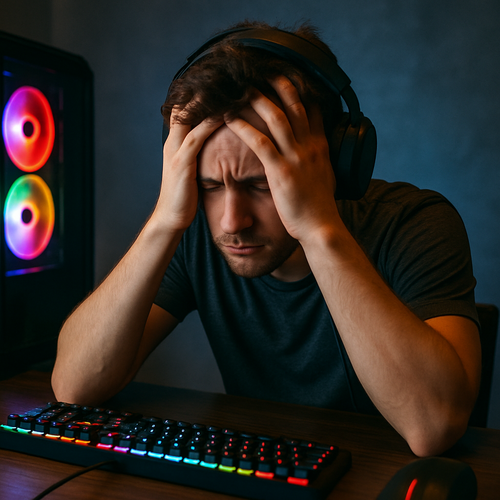What is gaming addiction?
Information about publication date: April 29, 2025

Gambling addiction, or ludomania, is a pathological gambling addiction in which a person loses control over time, money and consequences. This is not just a hobby or a form of entertainment, but a serious mental disorder recognized by the World Health Organization.
In this article we will analyze:- How to recognize addiction in yourself or a loved one
- What stages a person goes through
- Why dependency is formed
- What to do if you learn the warning signs
- Where to go for help
Why is dependency formed?
Games activate the dopamine reward system in the brain. Each bet, especially winning, causes the release of "joy hormones." Over time, the brain requires more and more excitement, and the reaction dulls - this forms a vicious circle:1. The game →
2. Win or lose →
3. Emotional outburst →
4. The desire to repeat →
5. Loss of control
Key Features of Dependency
Below are the key symptoms to watch out for. If a person has 3 or more signs on a regular basis, this is a wake-up call.
1. Loss of control
Can't stop even if you're losing- Promise yourself "one more time" - and do not hold back
- Trying to "win back" at any cost
2. Rise in time and rates
Spend more and more time on slots, bets, live games- Gradually increase the amounts - small winnings are no longer pleasing
3. Ignoring responsibilities
Miss work, study, meetings- Forget about household chores, family
- Everything revolves around "another back"
4. Financial difficulties
Take credits to play- Getting into debt or spending deferred money
- Lying about your expenses
5. Irritability and anxiety
Without playing, you feel discomfort, anxiety, apathy- Easily annoyed if you don't have access to the game
- Mood swings linked to game outcomes
6. Social isolation
Reduce contact with friends- Hide what you play
- Prefer the game to any other type of leisure
7. Denial and self-deception
Convince yourself that everything is under control- Trying to prove it's just "fun"
- Do not recognize the problem, even with obvious consequences
Stages of dependency
1. Winnings phase
Increased interest, excitement, each session gives an emotional "thrill"- 2. Losing phase
- Increased rates, attempts to recoup, growing tension
- 3. Despair phase
- Debts, isolation, loss of control, possible depression and aggression
- 4. Dependency phase
- No game - physical and emotional "breaking," loss of interest in everything except slots/bets
What if you recognize yourself?
Step 1. Acknowledge the problem.
This is the most difficult, but necessary. Without recognition, no treatment will begin.
Step 2. Restrict access to games.
Set locks:- Self-exclusion on casino sites
- Parental Controls/Browser Extensions
- Programs like BetBlocker, Gamban
Step 3. Talk.
Talk to loved ones. Or with a consultant. It is difficult to get out on your own, and social support is extremely important.
Step 4. Seek help.
There are anonymous programs, psychologists, helplines. This is not a weakness, but a real step towards recovery.
Where to go for help?
[Gamblers Anonymous (GA)](https://www. gamblersanonymous. org/) - international community- Psychotherapists who specialize in addiction
- Online consultations and support forums
Conclusion
Game addiction is not about willpower, but about brain biochemistry and psychological triggers. The earlier you recognize the problem, the higher the chance to cope without serious consequences.
Remember: gaming is fun, not a way to escape life. If they stopped pleasing, but began to devour time, money and strength - this is a call that cannot be ignored.
See also: "How to win back a bonus without harming the budget," "Tactics of minimal risk," "How to distinguish a fake casino."